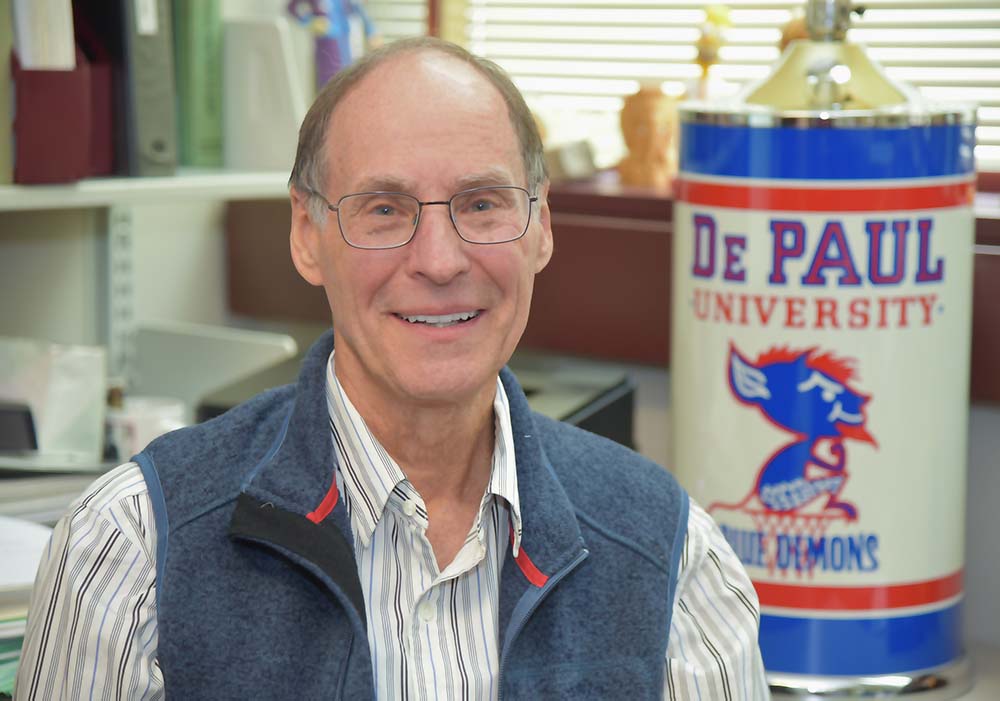 Professor of Economics James Ciecka
Professor of Economics James Ciecka
The Department of Economics recently celebrated 50 years of Professor of Economics
James (Jim) Ciecka teaching at DePaul University. Ciecka's career at DePaul began in 1962 when he attended the university as an undergraduate economics student. After completing his PhD, in economics from Purdue University in 1970, he returned to his alma mater as an assistant professor in the Department of Economics.
During his 50 years of teaching, Ciecka has had a profound impact on thousands of students. He is a nationally recognized expert in forensic economics, with a research focus on work-life expectancy. Following the 9/11 terrorist attacks, Ciecka was called on by the Department of Justice to determine economically valid compensation for the families of the victims.
His service to the the profession is long and significant. He has served on numerous university and college committees, served as chair of the Department of Economics, and is the co-editor of the Journal of Forensic Economics. During his time as department chair, Ciecka shaped the future for the Driehaus College of Business by hiring about 25% of the current faculty. He is highly regarded as a colleague, mentor and friend.
We recently spoke with Ciecka to discuss his time at DePaul, both as a student and as a faculty member.
What was DePaul like when you were a student?
I am a first generation college graduate. Or, more accurately, a first generation high school student. Because neither of my parents attended a single day of high school, my family background provided little information on what to expect as a college freshman. When I matriculated at DePaul in the early 1960s, the Lincoln Park Campus consisted of four buildings: Levan, O’Connell, Alumni Hall, and the old Barn where the great George Mikan played basketball a generation earlier and put DePaul on the map as a national university. A lone building, Lewis Center, was the Downtown Campus. Although short on physical facilities, the university was intellectually vibrant.
Daniel Q. Posin was in the physics department. He authored 30 books and had won six Emmys for his science education series broadcast by WGN and WTTW. Mary Alice McWhinnie was in the biology department. She was the first woman scientist to do research in Antarctic waters. McWhinnie Peak is named in her honor as is the Marine Science Center at Palmer Station north of the Antarctic Circle. Joseph H. Lehmann was in the history department. He authored books on the First Boer War and several volumes on European history. His lectures were more like stories; a 90-minute class seemed like 10 minutes.
What was the highlight of your undergraduate years at DePaul?
From my viewpoint as an undergraduate, DePaul’s real treasure was its economics faculty. Frank Brown, Jim Diamond, Bill Hayes, Bob Faulhaber, Adolph Mark and Bill Waters were talented economists, dedicated scholars and demanding instructors. Most of them were trained in a Catholic social thought tradition, but they understood that the economics profession was changing and they had the intellectual courage to hire new faculty who were trained differently. They knew they were making themselves obsolete, but their legacy is the current economics department and three generations of exceptionally well-trained DePaul economics students.
As a faculty member, what has been your most memorable experience?
After becoming a faculty member in the economics department, my DePaul colleagues have been a continuous source of learning for me over the past 50 years. Most importantly, I thank my research co-authors: Gary Skoog, Tom Donley, Tony Krautmann, Seth Epstein, John Berdell and Tim Opiela from the economics department; Jerry Goldman from the mathematics department; and Mark Frigo from the School of Accountancy & MIS. It is difficult to publish without administrative support. Mike Miller, Tom Donley, Tony Krautmann and Steve Carlton have provided unquestioning support for software, travel, expensive books, journal subscriptions, teaching assignments, and released time from teaching. Graduate assistants and students, like Sean O’Farrell, Gregory Bork and Dale Tobias, also have been vital for my research work.
What was your favorite memory at DePaul?
An old aphorism tells us that all work and no play makes us dull. My lead entry on the most-fun side of the ledger was watching great Blue Demons basketball teams perform at the highest national collegiate level. Terry Cummings was grace personified, Mark Aguirre’s had an exceptional ability to clear opposing players far from the basket, Tyrone Corbin could have been Olympic high jumper, and the top of Rod Strickland’s dribble seemed to be as high as his shoulder but opposing players, try as they may, were unable to steal the ball from him.
I end by stealing a line and lyrics from Bob Hope’s theme song: thanks for the memory to everyone mentioned above, either by name or indirectly as part of a group, and to thousands of students. I owe huge intellectual debts to the faculty I had as an undergraduate student at DePaul, my faculty colleagues at DePaul, and 50 years of students. These intellectual bills cannot be repaid, but it was appropriate to have at least acknowledged them.